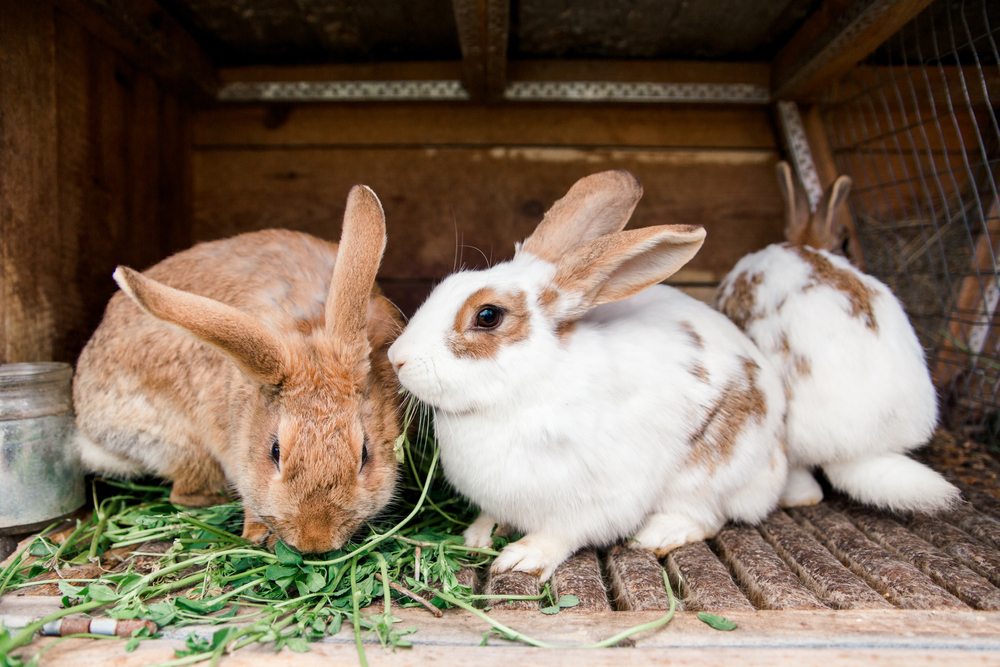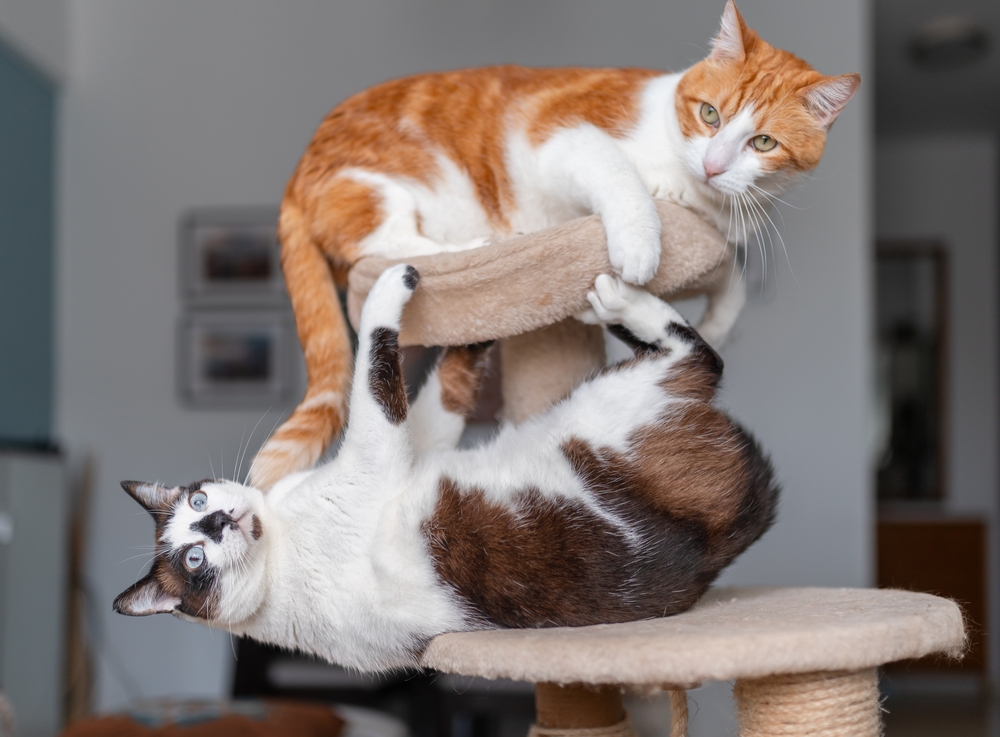How to Soothe a Scared Cat: 9 Cat Calming Solutions
by Carol Bryant
Published on April 26, 2024
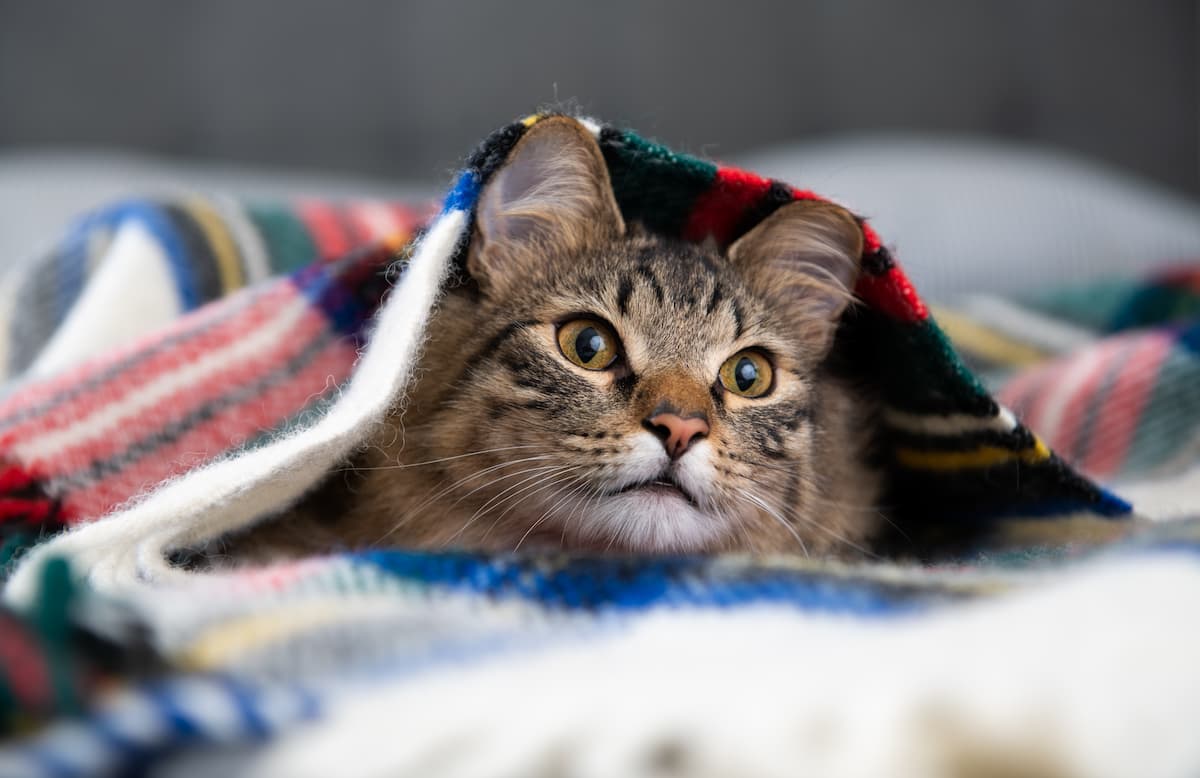
All featured products are chosen at the discretion of the Vetstreet editorial team and do not reflect a direct endorsement by the author. However, Vetstreet may make a small affiliate commission if you click through and make a purchase.
Ask any cat parent what stresses them out and you’re sure to get an earful. But one concern is so common, it almost seems cliche — how to soothe a scared cat.
The phrase “scaredy cat” first appeared in print in the 1930s, but cats have been battling fears since they first walked the earth. Unfortunately, those fears are often the root of unwanted behaviors — one of the main reasons some people surrender cats to animal shelters (1).
Fortunately, there are plenty of ways to soothe skittish kitties, ranging from behavioral interventions to cat-calming kitty litter. In this article, we’ll discuss what signs and behaviors pet parents should watch for, along with different tactics and solutions to help you calm your fearful feline.
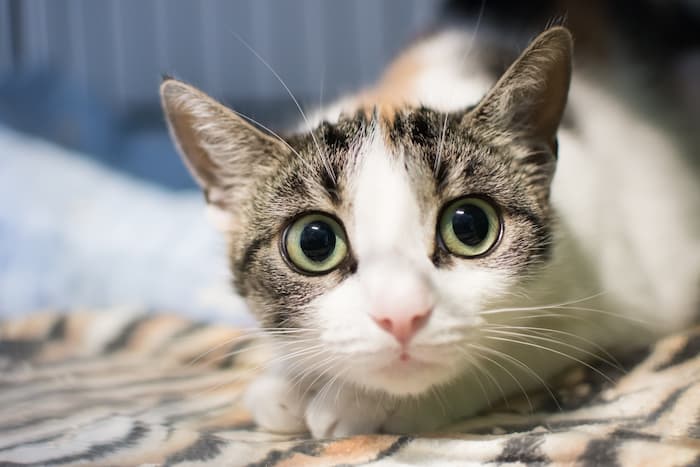
What Are Cats Scared Of?
If you own cats and have company over, you may notice the kitties scatter and hide when new people stop by. Cats prefer routine and have a remarkable sensitivity to their surrounding world. They can easily be startled by unfamiliar sounds, objects, people, or situations.
Understanding your cat’s fears can help you address the causes and reassure them things will be okay. So here are the most common fears cats face. How many of them send your frazzled cat fleeing from the room?
Sudden movements: This includes everything from dropping a book or moving a chair to reaching out to pick up your cat when they least expect it. Cats with a more timid personality tend to be startled, scared, or apprehensive in the presence of sudden movements.
Loud sounds: Cats can hear sounds that many other species cannot. Because they are sensitive to noise, they can become easily distracted, startled, or afraid of new sounds or unexpected thunder, lightning, fireworks, slamming doors, etc.
New people or pets: Cats prefer predictability and routine. If you have friends or family over or welcome a new pet to the pack, don’t be surprised if your cat goes into hiding. Some cats are very social, but many are skittish or a bit fearful.
Environmental changes: Did you rearrange the furniture? Add a baby crib to the bedroom? Cats prefer familiarity and stability, so even subtle changes could distress them.
Unfamiliar objects: If you’ve ever browsed the internet, you may be aware that even something innocuous like an unexpected cucumber can startle a cat. Why are cats scared of cucumbers? Some theorize it’s because cats mistake cukes for predatory snakes. But, according to the Feline Health Center at Cornell University’s College of Veterinary Medicine, it’s likely cats just get spooked by the sudden appearance of a novel object. (2)
Travel: If you’ve ever heard the fuss your cat exhibits when traveling in a car or to a veterinarian’s office, you know they aren’t happy.
Medical issues: Cats, like most animals, may display fear or anxiety in the face of underlying health issues. Because cats can’t tell us they are in pain, it’s up to pet parents to monitor their cats’ behavior. Because cats can be aloof by nature, consult a veterinarian if you feel your cat may have a health problem.
Water: Some cats instinctively despise or fear water. This is partly due to a cat’s lack of exposure to water and their innate cautionary personality.
Prior traumatic experiences: Cats who have been mistreated may have trust issues or feel nervous or apprehensive in certain situations.
Being alone: Cats may also become fearful or anxious if left alone for too long. They may meow excessively, may not eat or drink when alone, excessively groom themselves, engage in destructive behavior, and even become fearful of things.
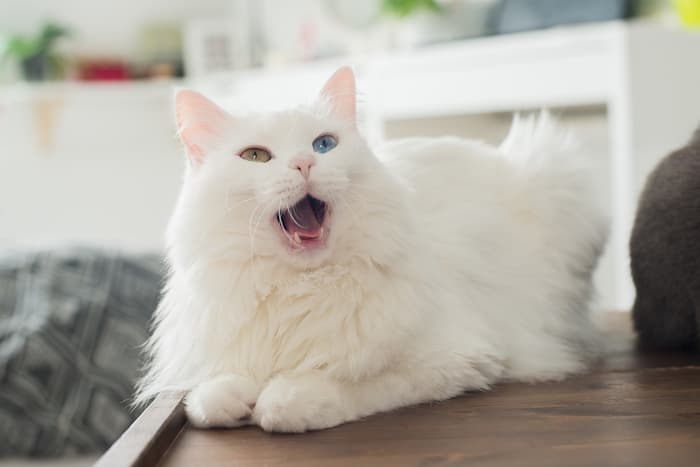
Understanding Scared Cat Behavior
A cat who feels fearful, afraid, or nervous may display any number of symptoms, including:
- Excessive meowing and vocalizing
- Shaking or trembling
- Showing signs of aggression (i.e., hissing, scratching, biting)
- Urinating or defecating outside their litter box
- Panic and trying to escape or flee
- Tail tucking and slinking around low to the ground
- Hiding and not wanting to come out
- Scratching at furniture
- Refusal to eat or drink
In addition, pay close attention to your cat’s body movements and positions. For example, the higher your cat’s tail, the more confident she may be. However, a tail raised high with erect fur that is puffed out indicates aggression or cause for alarm.
If your cat’s pupils are dilated, they are likely ready to attack or are afraid. Eye blinking is generally a peaceful greeting among cats, while direct eye contact without looking away or blinking can signal a challenge.
Cat Calming Solutions: 9 Options To Soothe a Scared Cat
“Cats are very sensitive animals,” says Sharon Daley, DVM, CVA, of Bunn Animal Hospital. “To feel safe, they should each have their own resources, including food and water bowls, a perch, a litter box, and toys.”
In addition to Dr. Daley’s suggestions, here are some more recommendations to help you soothe your scared cat.
Provide Familiar Comforts
Cats love to smell things that have your scent on them because you represent security. They also prefer familiar scents that represent basic needs, like their food bowl and litter box. So if your cat is acting scared or anxious, consider adding something that smells like you to their environment, like a jacket or favorite blanket. Is there anything more endearing than knowing your cat takes comfort in the aroma of you?
Use Calming Cat Litter
Speaking of soothing scents, now cats can enjoy the mood-boosting benefits of essential oils, too! Naturally Fresh has launched an innovative scented cat litter that combats odor and calms cats at the same time. Naturally Fresh Harmony Lavender & Bamboo Scented Cat Litter is infused with cat-safe essential oils designed to promote calmness in cats. Since cats use their litter box daily, a litter with mood-supporting scents makes a lot of sense. Being able to improve your cat’s well-being with a non-toxic cat litter made from upcycled walnut shells? Yes, please.

Stay Consistent
Cats are very observant, and they pay close attention to their people. Stick to a routine as much as possible and speak to your cat calmly to reassure them. Showing your cat everything is okay helps them stay calm.
Reduce Fear Triggers
If your cat appears scared by something they see outside, close the curtains or draw the blinds. Talk to your veterinarian about anxiety meds for cats if loud sounds bother them. Cats with extreme anxiety or fear may try to flee. Ensure doors are closed and that windows and screens are cat-proofed.
Engage in Regular Playtime
Playing with your cat may help reduce their anxiety. A tired cat is a happy cat, especially if you can get ahead of their triggers. And if you notice your feline friend becoming anxious, an impromptu play session may be just the distraction they need to allay their fears.
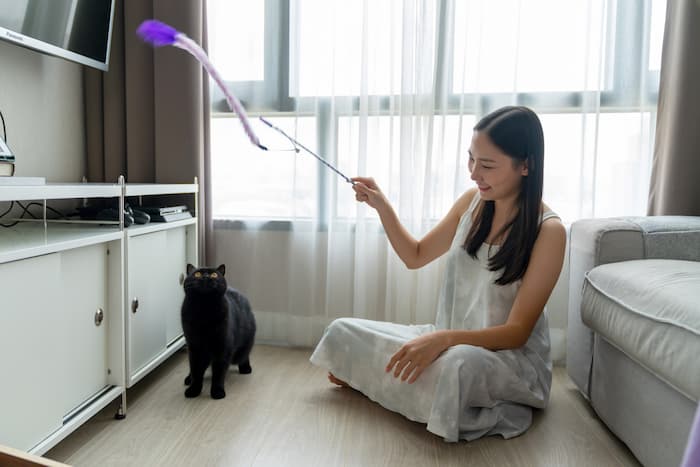
Don’t Force Them To Engage
That said, if your frightened cat disappears at the sight of a new visitor or a loud sound, let them have time alone. You want the cat to feel safe. Trying to force them from a place of comfort can make matters worse. Allow the cat to come out on their terms. If you really need your cat to move (say, for a vet visit) calmly lure or coax them out with a toy or treat.
Ask Your Vet About Calming Meds
It’s always a good idea to talk to your veterinarian if you’re concerned about your scaredy cat. For extreme cases, your vet may prescribe a calming medication. But there are also over-the-counter solutions that may help, like synthetic pheromones. These work by mimicking the chemical messages cats use to communicate with each other. According to Dr. Daley, it is not a magic bullet, but pheromones can help some scared cats relax.
Consult a Feline Behaviorist
Explore talking to a positive reinforcement feline behaviorist who can help you with your fearful cat. This professional can assess your cat’s history and temperament and help determine why they are scared.
Introduce New Things Slowly
Rather than rearranging the house all at once, consider moving a few things at a time. If you are bringing a new cat home, introduce them slowly and with supervision.
Calming Your Cat Like A Pro
Every cat is unique, so what works for one may not work for another. Some cats may take comfort in a cozy retreat until the fear trigger passes. Other cats may do well with mood-supporting cat litter. A multipronged approach, patience, and understanding are keys to helping your scared cat feel more at ease.
Here’s to happy, healthy, calm cats everywhere!
The author received compensation from PetSmart for their services in writing this article.
Resources


